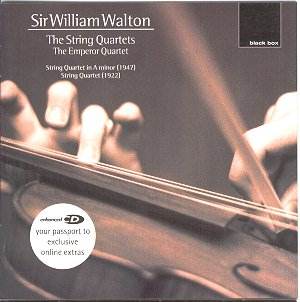 Composer: William Walton
Composer: William Walton
Works: String Quartet (1922), String Quartet in A minor (1947)
Performers: The Emperor Quartet
Recording: Potton Hall, Suffolk, August 14-16, 2000
Label: Black Box BBM1035
Duration: 58:51
Release Date: October 2001
William Walton’s contributions to the chamber music repertoire, particularly his string quartets, have often been overshadowed by his more celebrated orchestral works and vocal compositions. However, the recent recording by the Emperor Quartet sheds illuminating light on both his early and mature stylistic phases, offering a compelling juxtaposition of the composer’s evolving voice.
The early String Quartet (1922) serves as a fascinating entry point into Walton’s compositional journey. Although still under the shadow of contemporaneous influences—most notably Alban Berg—this work is not devoid of the nascent Waltonesque characteristics that would soon crystallize into a distinctive voice. The initial Moderato unfolds with a chromatic intensity that hints at the lyrical elegance to come, particularly around 1:55, where a climactic moment gives way to a gentle, rocking motif. This early work possesses a poignant lyricism, especially evident in its outer movements, which display Walton’s burgeoning command of emotional expression.
By contrast, the String Quartet in A minor (1947) reveals the composer at the height of his powers, wherein the confidence and clarity of his mature style is unmistakably present. The Emperor Quartet’s performance here is marked by a remarkable understanding of the work’s structural complexities. The languorous Allegro opens with a rich thematic statement that seamlessly transitions into a fugue, showcasing Walton’s mastery of contrapuntal writing. The quartet’s ability to articulate the brittle energy of the scherzo, coupled with the deep emotional resonance of the Lento, is particularly noteworthy.
The finale, with its jazz-influenced syncopations, propels the listener forward with a vigor that is undeniably compelling—a testament to the ensemble’s dynamic interpretation. The rhythmic articulation they achieve is taut and precise, particularly in the driving passages of the final movement, which had me on the very edge of my seat—a rare accomplishment for any ensemble tackling Walton’s intricate rhythms.
In their approach to both quartets, the Emperor Quartet’s interpretative choices are characterized by a blend of passion and technical finesse. They navigate the earlier work’s complex harmonic landscape with a sensitivity that brings out its emotional depth, while in the later quartet, they exhibit a controlled exuberance that captures Walton’s mature language with freshness and vigor. This performance stands out not only for its interpretative clarity but also for its ability to convey the underlying drive of Walton’s musical ideas.
Comparatively, while other notable recordings—such as the Borodin Quartet’s interpretations—provide a solid foundation in Walton’s chamber music, the Emperor Quartet’s rendition uniquely balances youthful enthusiasm with a sophisticated understanding of the works’ historical context. Their meticulous attention to detail in both phrasing and dynamics sets this performance apart, particularly in the way they navigate the differing emotional landscapes of the two quartets.
The recording quality of this Black Box release is commendably natural and realistic, allowing for a vivid auditory experience. The acoustic of Potton Hall captures the ensemble’s sound beautifully, bringing forth the subtle nuances of Walton’s writing without any sense of artificiality. The engineering presents the instruments in a balanced manner, ensuring that the rich textures of the quartets are fully realized.
Historically, Walton’s string quartets represent significant milestones in the development of British chamber music in the 20th century. The 1922 Quartet offers a glimpse into the composer’s formative years, while the 1947 work exemplifies a mature artist who has fully embraced the stylistic innovations of his time, yet remains rooted in the lyrical and rhythmic traditions of English music.
In conclusion, this recording by the Emperor Quartet is a commendable addition to the Walton discography, offering listeners an insightful exploration of the composer’s evolution as a chamber musician. The juxtaposition of his early and later quartets not only highlights Walton’s technical growth but also his deepening emotional expressiveness. For anyone intrigued by the nuances of Walton’s music, this disc is an indispensable recommendation.